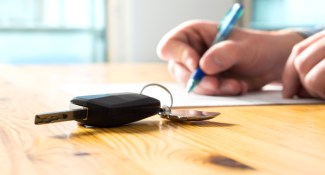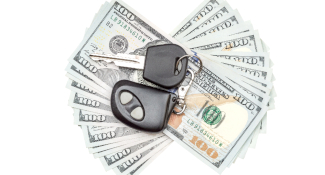Buying a car, especially in California, can be a stressful task. Whether you are buying from a dealership or a private party, there are a few differences in California compared to other states.
There are some simple things you can do to make the process go smoothly, and many of these will be helpful regardless of location, but there are a few specific rules, regulations, and documents that you will need to understand to make your California car purchase as easy as possible.
Specific Tips & Fees for Buying From a Dealership in California:
California is a massive state with over 39 million people and at least 14 million registered cars. Needless to say, you should be able to find a new vehicle that fits your needs, but California also has some unique differences from many other states when buying a car.
The State of California requires you to have a driver’s license and auto insurance in order to purchase a vehicle. Make sure these two needs are lined up prior to heading out car shopping. Most car buyers purchase cars from an auto dealership, and dealerships sell both new and used cars.
When buying a new car or a used car from a dealership, dealers are required to disclose fees that are charged in addition to the price of the car. The fees may include advertising fees, which you may be able to negotiate down or get rid of completely.
One additional cost you will not be able to avoid is sales tax. You will be looking at a minimum tax of 7.5%, but may pay more depending on other applicable city or county taxes. A title or pink slip fee and California vehicle registration fee will also be required and costs $21 and $58 respectively.
Depending on where you live there may be some additional fees. Dealers may charge documentation fees, filing fees, a California Highway Patrol fee, zero-emission vehicle parking sticker fees, reflective license plate sticker fees, air quality management fees, crime deterrence fees, or smog certificate transfer fees. Remember to ask for clarification if you are unsure of what a fee is or why it is being charged. Contact the California DMV if you think you are being charged fees that are not warranted for your specific transaction.
If buying used, you can have a diagnostic check done at one of the thousands of California Bureau of Automotive Repair (BAR) approved mechanics for around $60. You will also pay a title transfer fee which is five dollars less expensive than the title or pink slip fee for new cars.
Buying From a Private Party in California
Buying from a private seller can mean more savings, but will require more work for the buyer, and may also mean fewer consumer protections.
The fees and taxes described in the previous section all still apply. Because there are fewer protections for the buyer, doing your research is even more important.
Be sure to get the vehicle history report, have a pre-purchase inspection completed, complete and sign a Bill of Sale, and if possible pay with a cashier’s check or money order instead of cash.
The buyer needs to have a VIN inspection at the DMV in person, register the vehicle, and get a Certificate of Ownership within ten days in order to avoid late fees or other penalties.
The vehicle will also have to pass a smog test.
The Change-Of-Ownership test is required for cars that are more than four model years old but made after 1975. Though the test should be completed and a certificate of compliance provided by the seller, this is not always completed prior to private sales.
A vehicle without up-to-date smog certification will have to be checked, which is costly, and any repairs required may also add to that financial burden.
Buying a Car From Out of State and Bringing It Back to California
If the market in Los Angeles, the Bay Area, and San Diego don’t have what you are looking for, out-of-state vehicles are still an option. There will be different steps to make your purchase California legal.
The car will have to meet California smog requirements in order to be registered to drive in the state. Some cars are sold as 49-state legal, meaning they meet federal regulations but not California, and may not be able to be registered in California.
If a car is more than two years old or has more than 7,500 miles it can be registered in California, provided it can pass the state’s smog test.
Steps for General Car Buying:
There are a few important tips for buying a car in California, or anywhere else in the United States. This process will be similar wherever you are, and a buyer looking for a new ride should follow these key steps throughout the purchasing process.
Set a budget:
You should know your budget and understand how you will pay for the car such as if you plan to pay cash, or if you are getting a loan. If you are shopping at dealerships focus on the overall cost of the car including the monthly payment, but also consider the interest rate and loan terms. Dealerships may try to sell you on a longer loan to get monthly payments to a lower level. Lengthening the loan increases the total cost of the purchase due to additional interest.
Research:
The very first thing you should do when buying a car is to gather information. Think about what you need and want from the vehicle, and find cars that meet those desires.
Do your research in advance and know what a fair price for the vehicle is, as well as any specific features you want or warning signs to look out for. Also, know the fair market value of your current car if you plan to do a trade-in. Do all of this before going to look at the car in person.
Test drive:
Once you have narrowed down your search and budget to a few options, go look at and test-drive some cars. Because you have already armed yourself with the information, you will know what to look for from each make and model and you can focus on finding what fits your needs the best.
Learn vehicle's history:
Once you have your eye on a specific car, record the car’s vehicle identification number (VIN) and use a website like Carfax to check the car’s vehicle history report. This will include information about ownership history, odometer readings, and accident history, and may even include maintenance information. Many dealerships will provide this information for free when purchasing a used vehicle.
Pre-purchase inspection:
If buying a used car, get a pre-purchase inspection. Not every incident or issue may be reported to websites like CarFax, so you’ll want to have a professional give the car a thorough inspection. Cars are generally one of the biggest purchases an average person makes.
Be sure you are investing your hard-earned money in a car that is road-worthy and with no obvious issues. A mechanic should be able to conduct an inspection for less than $200 and provide you with peace of mind for your potential purpose. If the seller does not want to allow you to have the car inspected, walk away.
Make an offer:
If everything checks out, it’s time to make an offer. Remember your research and stick to the plan you had before you set out. Don’t let the dealership or seller pressure you out of your pre-determined budget or loan terms. If you come to an agreement, you can move on to the financial transaction.
At a dealership, much of the documentation work will be done for you. If buying from a private seller, consult the Department of Motor Vehicles to make sure the title transfer, bill of sale, and other documentation are completed properly. When paying, be cautious with sellers who will only accept cash. A cashier’s check or money order provides you with more protection.
Negotiating:
Car dealerships will also try to sell you additional extended warranties, insurance policies, or packages once you are passed off from the salesperson to the finance department. Keep in mind these are not required and should be negotiated separately from the purchase price of the vehicles.
You will have to decide if the peace of mind of an extended warranty is worth the money, but know this will increase the total cost of the car. Other packages that may be offered include wheel and tire protection, paint protection, or scheduled maintenance plans.
The dealer may also try to sell you Gap Insurance which covers the difference between what the car is worth and the loan amount. Gap insurance may make sense for you, but can probably be purchased at a lower cost from your car insurance provider.
Car Buyer’s Bill of Rights
Another unique feature of California car buying is the Car Buyer’s Bill of Rights, which give some additional protections to those purchasing a car from a dealership. Dealerships must offer buyers the opportunity to buy coverage which allows the purchaser to cancel the deal for any reason within two days of completing the purchase of a used car. There are some stipulations though, the car must be in the same condition as when it was purchased, the car must have fewer than the agreed-upon additional miles (250 is the legal minimum), and the vehicles must not have any tickets or liens.
Vehicles sold as “Certified” used cars, must meet certain requirements. The car cannot have a salvage title, cannot have a lemon law history, cannot be sold as-is, and cannot have frame damage. The car cannot have a history of odometer tampering or invalid mileage history. The car also cannot have damage from fire, flood, theft, or accident unless it has been properly repaired.
Dealerships must include a detailed list of costs including the price of the vehicle and any other products including service plans, warranties, protection products, and the two-day option to cancel insurance. This detailed price list must also break down the difference in monthly payments, with and without the additional charges. In addition to this list, dealerships must disclose the credit score information used to get financing.
There are also legal limits on loan markups. Dealerships sometimes raise the interest rate of financing and keep the additional profit. These hidden costs can make loans more expensive. California limits these markups to 2% for loans of more than 60 months and 2.5% for loan terms of less than 60 months.
The Car Buyer’s Bill of Rights does not apply to motorcycles, off-road vehicles like ATVs, or to transactions between private parties.


